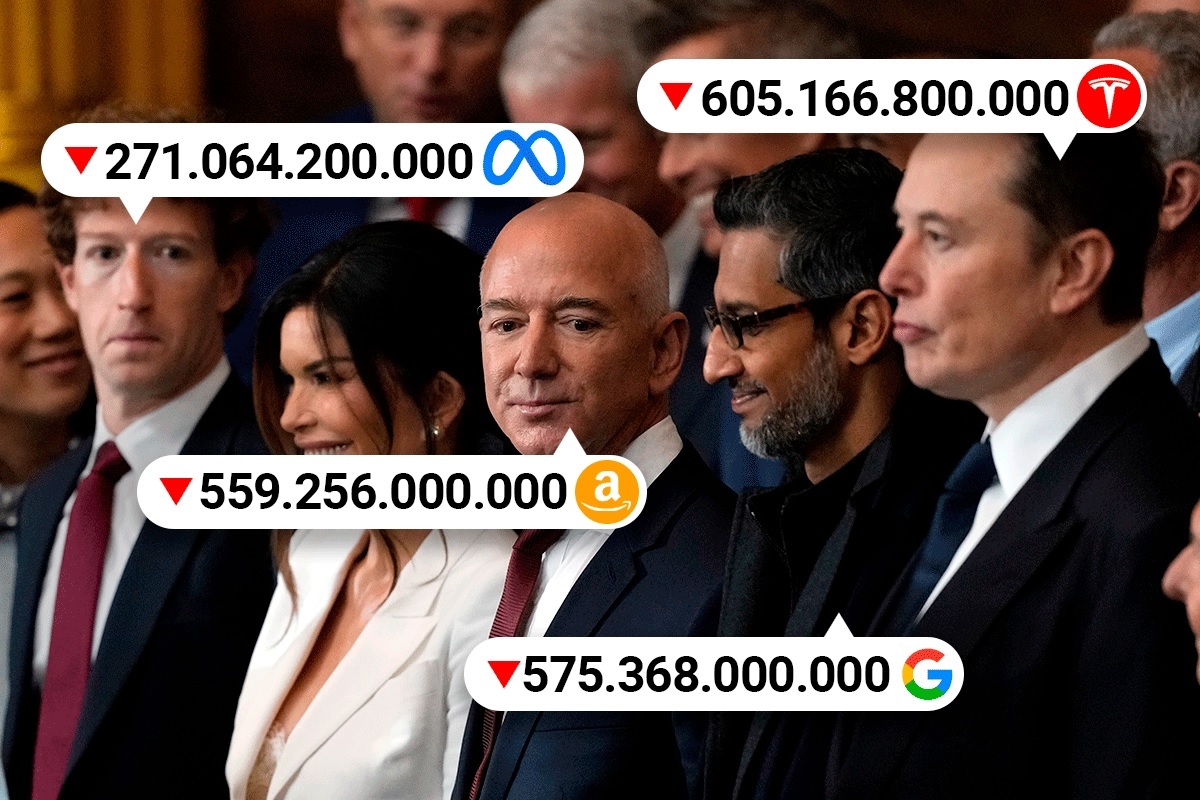On January 20, 2025, a photograph made headlines worldwide: at Donald Trump's inauguration, the owners and founders of some of the most relevant companies in the country (and the world) shared a seat. Mark Zuckerberg (Meta), Jeff Bezos (Amazon), Sundar Pichai (Microsoft), and Elon Musk (Tesla) were part of the ceremony welcoming back the man who promised a new golden age for the United States.
Something paradoxical, no doubt, given the international nature of their companies and the never-hidden intentions of the new American president to reshape global trade with (his) measures and tariffs. This week, Wall Street experienced its worst drop in five years; a collapse equivalent to the disruption caused by the Covid-19 pandemic. Trump's tariff policy has been particularly focused on the Asian region, where many direct partners of the American giants are located. The losses on Wall Street have been significant, and the companies of the individuals in the photograph have grabbed the most negative headlines. So much so that the four companies (Tesla, Amazon, Meta, and Alphabet) have accumulated losses nearing 2.04 trillion dollars.
The evolution of the business damages starts from the left. Mark Zuckerberg, owner of Facebook, Instagram, and WhatsApp, and the reason he is mentioned in this text: CEO of Meta. Despite his disagreements with Trump (whom he banned from his platforms in 2021), both made peace in view of the new economic era of the country. The company, a member of the so-called Magnificent Seven, had a year-on-year growth in its market capitalization of 59.80% before the photo was taken (close to 580.179 billion dollars). These profits are now reduced due to the current stock market crisis: in yesterday's session, another dark day on Wall Street, Meta fell by 5.02% (the day before it dropped by 8.96%). Since the photo with Trump was taken, its stock has decreased by around 17.60% (approximately 272.809 billion dollars). According to the Bloomberg Billionaires Index, Zuckerberg has seen his personal wealth diminish by 18.6 billion dollars so far this year.
In the photo, alongside Zuckerberg, are Lauren Sánchez and her partner, Jeff Bezos. The CEO of Amazon, the next character from the tech elite, as some media describe them, surprised the world when he appeared at the president's inauguration, with whom he had disagreements in the past but to whom he donated nearly a million dollars for the event (and closed a deal for a documentary about Melania Trump). In the year before Trump's return, Amazon grew by 45.45% (around 748.360 billion dollars). Now, the retail giant is suffering from Trump's tariff policy, with a reduction in its market capitalization of 22.87% (approximately 547.702 billion dollars). Amazon closed yesterday's session with a 10.6% drop.
Following Bezos is Sundar Pichai, CEO of Google. Google's parent company grew by 33.90% in the year before Trump's return, equivalent to around 604.867 billion dollars. Now, Alphabet is also among the fallen from grace, with losses in the stock market reaching 4.5% in the last session. Since the start of the trade war, its value has decreased by 27.6%, or around 615.473 billion dollars.
Last but not least, Elon Musk. Founder and CEO of Tesla and SpaceX, among other companies, he is, to date, part of the Trump Administration. In fact, in the year leading up to the inauguration, and as his prominence in the new America was becoming evident, the value of the vehicle companies surged by 101%, adding 690.078 billion dollars to their market capitalization. Despite the figures, among the Magnificent Seven, his is the most penalized in the course of events (which not only involve a trade war but also a decline in the magnate's popularity), with a cut in value approaching 44% (602.655.2 billion dollars).
The Magnificent Seven, in the red
At Trump's inauguration, perhaps not physically present but indirectly, was Microsoft. One of the curiosities of the president's inauguration was the million-dollar donation from major tech companies for the event.
Among them was Bill Gates' company, which increased its value by 7.62% (around 225.574 billion dollars) in the year before Trump's return. However, it also suffered a 2.6% drop on the last day of Wall Street, yesterday. In total, since the president's inauguration, it has lost 16.09% of its value (around 512.892 billion dollars).
Another member of the Magnificent Seven and also absent from the photo is Apple. This giant has experienced a Wall Street crash in recent days, as a significant portion of its device production is based in Asia, where Trump has imposed his most severe tariffs. While it managed to grow by 20% in the year before Trump's inauguration (around 583.984 billion dollars), in the following months, the tariff crisis has caused it to lose 18.09%, nearly 632.320 billion dollars. It dropped by 12% in yesterday's session, being one of the worst declines within the tech-heavy Nasdaq.
Also among the Magnificent Seven, the tech company Nvidia (which recently faced the Deepseek crisis) has not been able to escape a new crash. The value of the hardware and software manufacturer skyrocketed in the year before Trump's inauguration, multiplying its value by 131.48% (surpassing 1.908 trillion dollars). Yesterday, it suffered a 13.6% cut, another one of the most severe drops in the Wall Street trading session. In total, since Trump's arrival, its value has decreased by 31.49% (equivalent to 1.05 trillion dollars).
The photo comes at a cost: starting from Trump's inauguration, the Magnificent Seven have already accumulated losses of over 4.2 trillion dollars.
